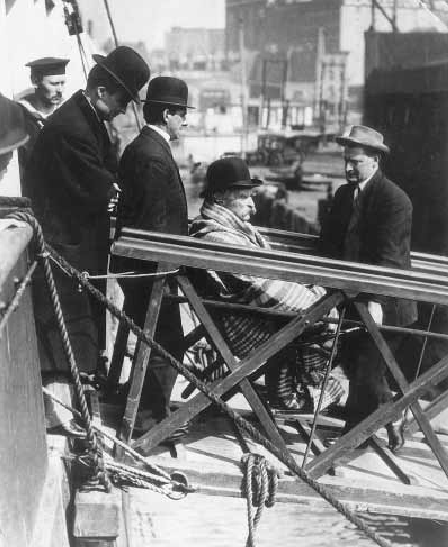12. Illusions of Love
MARK TWAIN SENT OUT photographic postcards to mark the Christmas season of 1908. In the image he duplicated for his friends, Twain sits squarely in a window at Stormfield, with a petite Lyon standing in profile on his left outside the window and a goateed Ashcroft hovering just behind him on his right. As the photograph plainly displays, Isabel and Ralph had become Mark Twain's family. He did not make a move without them, and anyone who stood in the way of their dominion was at risk. Lyon, who had already told the entire countryside around Redding that Jean was to be exiled for life “because she was ‘crazy’” was also busy spreading a rumor that Clara was “insane” and simultaneously subverting the daughter's authority at Stormfield. Lyon could dismiss a servant at will. Only Katy was protected by her past tenure, but even the faithful family retainer was under attack. Paine was holding onto his biographer's role by a thread. The pair of manipulators had so effectively insulated the old man that his relatives were afraid to approach him.[1]
Even his own daughters did not have access to their father except through his two pets. Jean remained in exile in New Jersey, and Clara was chafing furiously under the budgetary restrictions placed upon her by the woman who signed her father's checks. Try as she might, however, Clara got nowhere when it came to criticism of Lyon. “I wouldn't listen to any attack upon her character or conduct,” Twain later confirmed, “no matter who or what they might be.”[2] Clara's frustration grew as she repeatedly saw what everybody close to him knew: her father was a captive of Lyons persuasions.
Both Ashcroft and Lyon had become convinced that they owned Mark Twain, that, as Twain so cogently observed, “I couldn't help myself.” In fact his two employees campaigned to create a relationship of total dependence. And it was almost natural that he became as persuaded as the pair of manipulators that they were indispensable. “[T]here was no menial service which he omitted,” Clemens remarked about Ashcroft, whose daily ministrations, down to stripping him at night and putting on his nightshirt, fooled all three of them into believing that Clemens could never do without them. The effectiveness of Benares and the appropriately dubbed Nana was not simply that they served his physical needs. They combined exquisitely detailed service with something else even more potent: the illusion of love. “There isn't anything that Benares wouldn't fix for you in your own way, if he could; for you stand first in his heart as in mine,” Lyon crooned in a note written to Clemens in February. “And our dearest wish is to try to fulfill your slightest wish.”[3] It was heady stuff to have two intelligent, witty, sophisticated adults vying to fulfill your “slightest” wish and flattering your every conceit.
Other less susceptible folks were also fooled. Dr. Quintard, the family doctor, remarked that “for three years she deceived him completely. All through that period he regarded her word as gold, her spirit as beautiful, her ideals lofty.” Exactly what tipped the scales against Lyon in Quintard's mind is unclear, but it started with Clara, who had borrowed $500 from him in the spring of 1908. Eventually, Clara told her father, Dr. Quintard called her to a consultation and insisted that Twain's secretary and man Friday were crooked and should be investigated immediately.[4] The doctor apparently perceived the incongruence of Clara's pinched (by her measure, at least) financial circumstances in the midst of her father's plenty. Though Clara probably exaggerated his role as instigator, Quintard played a crucial part in solidifying her angry frustration, sullen discontent, and suspicions into a plan of action.
“Ask for an audit” was the doctor's advice—but it was to prove harder than it sounded. Twice, with her father's permission, Clara arranged with a lawyer named Jackson for an investigation of Lyon and Ashcroft, and twice Clemens then nixed her plans. Twice Clara resolved to see Mr. Rogers with Clemens's knowledge, and twice her father opposed the errand.[5]
He first engages the debate by vigorously attacking the “Stratfordola-tors and Shakesperiods”—those who uncritically believe that Shakespeare was actually a farmer turned actor from Stratford. He also defends the then popular theory that Francis Bacon wrote the plays. But after his passionate diatribe against the “Stratfordolators” and his vigorous support of the Baconians, he cheerfully admits that both sides are built on inference. Leaving no doubt about his satirical intent, Twain then gleefully subverts his entire argument. After seeming to be a serious, even angry, combatant, he denies that he intended to convince anyone that Shakespeare was not the real author of his works. “It would grieve me to know that any one could think so injuriously of me, so un-complimentarily so unadmiringly of me,” he writes mockingly. “Would I be so soft as that, after having known the human race familiarly for nearly seventy-four years?” We get our beliefs at second hand, he explains, “we reason none of them out for ourselves. It is the way we are made.” Twain has set a trap—an elaborate joke at the expense of what he scornfully refers to as the “Reasoning Race.” He is satirizing the need to win an argument when it is virtually impossible to convince anyone to change sides in almost any debate. His excessive rhetoric of attack is obviously absurd—calling the other side “thugs,” for example—yet it has been taken at face value.[7]
As the essay's subtitle, “From My Autobiography,” clearly signals, Twain is also examining his own life, especially his place in history.[8] Punning on his family name, he considers the success of various “claimants,” that is, those who make large assertions about the meaning of their life, including Mary Baker Eddy, and of course Samuel Clemens. Shakespeare was not a claimant in his lifetime, Twain notes, dying in obscurity
As the chill of a Connecticut winter surrounded Stormfield, a different sort of frost was withering all sentiment between Clara and her father's pets. Despite the setbacks, Clara was stubbornly determined to audit Lyons accounts and would not be deterred. (Interestingly Lyon would later blame Paine for instigating the audit, even though he sailed for the Mediterranean in mid-February, to retrace Twain's steps in The Innocents Abroad, and was not a participant in the early battles of the audit war.) Getting wind of Clara's intentions, Ashcroft called her on the telephone. He was willing to be examined, but did she really want to risk an investigation, he asked with mock innocence. Puzzled, Clara demanded an explanation. Well, he responded, was she willing to risk exposing how much of her father's money she had been spending these past months? Ashcroft produced a figure—$860 for a recent month—that Clara vehemently denied.[10]
Ashcroft's ploy is instructive—both clever and self-defeating. He not only disapproved of Clara's lifestyle but believed her father would be similarly disturbed. He also apparently thought Clara would be ashamed or at least embarrassed. Clearly her spending habits bothered him. And his censorious attitude was a crucial ingredient in the pattern of denial in 1908 that had sparked Clara's investigative zeal. He failed to grasp that his adversary was not especially guilty about spending money. The spoiled, pretty daughter of a father who communicated his sense of intellectual superiority and of a mother who imbued her with a sense of genteel privilege, Clara was not a woman to be intimidated about money. Self-centered and confident, she possessed a strong sense of her entitlement. Clara Clemens backed off not an inch from her audit plan.
Though the idea of an audit frightened Ashcroft, he did not show it. Outwardly charming and pleasant, he was his normal self, according to Clemens. Lyon, however, could not disguise her distress. She was the one who had check-signing privileges, paid the bills, and was responsible for the family budget. As the pressure mounted, she began to drink heavily. Ashcroft referred to her outbursts as “hysterics,” and attributed them to overwork. Cocktails, whiskey, and bromides might be a more accurate list of causes. Clemens said later that he never suspected whiskey was the main culprit.[11] But if he failed to grasp that his secretary was an alcoholic, he apparently was finding her increasingly difficult to live with. Although he still staunchly defended her to others, he claimed he was “beginning to cast an eye around for somebody to take her place.”[12]
Unwell much of the month of February, Lyon reported she was perilously close to a nervous breakdown and received daily visits from the local doctor. Her spells and the three-day headaches that sent her to bed were nothing new. Even her retreat to Hartford to be near her mother the last week of February was not unprecedented. Here again was an “episode” that followed the usual pattern of collapse and renewal, usually accompanied by substance abuse but always closely associated with a fresh strategy to benefit herself. It was while she was in Hartford that Ashcroft presented her new plan to the boss. Awkwardly, sheepishly, hesitantly, he told Clemens that he and Isabel were getting married.[13]
“It was as amazing as if he had said they had concluded to hang themselves,” Clemens confessed. He was dumbfounded, he told Ashcroft, at this “unbelievable” and “insane” idea.[14]
‘We'll put it aside,’ Ashcroft quickly assured him.
‘No,’ he insisted, ‘you must go your own way and take the responsi-bities yourselves.’
‘We'll postpone the marriage, as long as you wish.’
Clemens told him that he was not willing to participate in this decision in any way.
‘We'll marry secretly then,’ Ashcroft promised, struggling for middle ground.
‘Don't think of such a thing,’ Clemens replied. “[I]t could get us all into hot water presently.”
Ashcroft repeatedly assured Clemens that nothing in his household would be changed by the marriage, that it would be just like old times.
‘There will be no babies,’ Ashcroft said coolly and authoritatively; ‘it is not that kind of a marriage.’
“Why, how you talk! Don't you love her?”
“Not in that way.”
“Then what in the world are you marrying her for? What is your reason?”
‘Because she needs my care and protection and I sympathize with her vulnerability and want to nurse her back to health,’ Ashcroft replied dispassionately.
“Marriage without love,” Twain responded, “is foolish and perishable.”
‘It is not a marriage wholly without love,’ he parried, ‘because she loves me and I have a great respect for her character and qualities.’
Ashcroft returned to the subject of babies and flatly asserted there would be none because there was nothing animal in his relationship to Lyon. At that point Clemens bet him ten dollars to one that they would have children—probably responding to Lyons youthful style more than her chronological age of forty-five. He again reiterated that he would not have married people in his house. As he recognized later, neither one believed him.[15]
Explanations for Ashcroft and Lyons motives for this marriage multiply depending on the interpreter. Perhaps it was meant to assuage Clara by eliminating any possibility that the secretary would marry her father, thus reducing (they hoped) her feelings of distrust. Forestalling an audit was certainly one of their major goals, as is reinforced by the fact that in the first week of March Clara's monthly allowance was raised to four hundred dollars. This one-two punch was meant to take Clara out of the match: give her more money and reduce her fears that her father's estate was vulnerable through marriage—though of course Lyon did not articulate such a motive publicly. Perhaps the secretary also thought tying the knot would allay any local gossip about her relationship with her employer.[16]
Both Ashcroft and Lyon skillfully presented the reasons they gave for marrying. Ashcroft portrayed himself to Clemens as a self-sacrificing bridegroom, marrying only to give Isabel protection and nurse her back to health. This was hard to swallow, even for a still-trusting boss, who thought at the time that Ashcroft was being hypocritical. Unclear as to
Thirty years later Lyon told a dramatically different story as she reminisced with an undercover detective posing as a literary agent. “She stated that her marriage was part of a deal whereby she would thus legitimize her standing in the household in consideration of the breaking off of all relations between C.C. [Clara] and ‘Will,’” the detective reported. She told him that this deal was “originated by Mr. C. [Mr. Clemens], who objected strongly to ‘Will,’ and was honorably carried out by both women.”[18] Will Wark was Clara's accompanist.
By February, when the Ashcroft-Lyon marriage was hatched, Clara and Lyon were barely on civil terms. “Frost on the vine” was how Twain described it; sentiment between them had been “withered, rotted, squashed” and “discarded,” in Twain's inimitable words, “[f]or all time.” Clara was intent on a full investigation of Lyon, whom she, by then, considered an enemy. Moreover, Clemens was not a man to propose human trades with the people he loved. Believing as he did that marriage without love was “foolish and perishable,” he would not have conceived this kind of human swap—whatever his feelings toward Will Wark.[19]
“I can't go on alone carrying the dear weight of wonderful Storm-field,” Lyon wrote Clemens, somewhat more convincingly. “And you won't ever know anything different from the present plan,” she reassured him, “except that I will have one with the right to watch me, & keep me from breaking down.” Striving to convince her boss that the impending marriage would change nothing for him, she described her feelings for Ashcroft in unusual terms. “[W]e have grown very close together in our love for you,” she told him, “& we couldn't be happy away from you.”[20]
In fact, marrying Ashcroft was a serious miscalculation on the secretary's part. It did nothing to placate Clara, and it distanced Clemens in ways that began to break her death grip on his mind. His furious and, in part, no doubt jealous reaction to her engagement suggests that his possessiveness was more than paternal. It was a major jolt to discover that the woman who had been acting as his surrogate wife for several years was about to become someone else's real wife.
Several days after Ashcroft announced their prospective marriage, Clemens told him directly that Clara wanted an audit. The timing hardly seems coincidental. Presumably Clara had been pressing her father all winter and suddenly, at the beginning of March, he decided to get behind the audit idea. Ashcroft's response was predictably chilly, though Clemens claimed he expected lighthearted compliance. That his man Friday was not overjoyed at the prospect seemed suspicious to him. He declared that this was his first warning that something was amiss. “The frost touched me then;” he wrote, “but it was only a touch, it did not invade my bones right away.”[21]
Aware of the sudden shift in her fortunes, Clara raced to see Mr. Rogers, who said he would talk with Ashcroft and have him bring the checkbooks and vouchers to the Standard Oil offices, where they would be examined by an expert. Clara, by now a veteran in the audit wars, knew enough not to celebrate yet, but she did pounce upon her unexpected advantage. Knowing that the secretary and business manager held the keys to her father's safety deposit box, Clara persuaded him to revoke their authority to use the keys and to ask for their return. She also persuaded her father to obtain an independent inventory of the contents of the box. It agreed with a previous list made by Ashcroft. Nothing was stolen or missing in the box, according to the report from Twain's emissary, Mr. Duneka, who was the general manager for Harper's, Twain's publisher.[22]
Still Clara had the sense that something was awry. About this time she went on a shopping expedition with Katy. Admiring an especially delicate piece of underwear, Clara longingly laid it aside. When Katy asked her why she didn't buy it, Clara responded that she couldn't afford it.
“Why, Miss Clara, Miss Lyons got lots of those things,” Katy exclaimed. “Miss Lyon affords it, & so I don't see why you can't.” Clara's
“Because she can sign checks for my father. I can't,” Clara snapped peevishly.[23]
Katy's questions took deadly aim at the heart of Clara's anger. In this instance, and perhaps others that went unrecorded, the loyal servant reminded Clara of Lyons free-spending ways and reinforced her determination to reign them in. Despite that determination, however, her father foiled her once again. If, as he later claimed, “relations were now strained-strained all around,” including himself, the strain was either short-lived or very slight.[24] Ashcroft had refused to turn over the various pieces of bookkeeping evidence to Henry Rogers, and, on the evening of March 10, he succeeded in talking Clemens out of the independent audit Clara and Rogers had arranged.
At half past two in the morning of March u, Clemens, who was unable to sleep, took pen in hand to explain this decision to his daughter. It was Clara's worst nightmare come true, for Ashcroft had talked his boss into letting him do all the accounting. The checkbooks were not to leave his house, Clemens insisted, under the influence of his business manager's persuasions. Friends could read Ashcroft's reports and discreetly compare his numbers with the checkbooks and bank deposits. Unless you can furnish concrete evidence of their wrongdoing, he firmly instructed his daughter, we will wait for Ashcroft's report. Dismiss your lawyer, he advised Clara, for you will find that his services are unnecessary.[25]
Clemens went on to lavishly praise Miss Lyon as a housekeeper, house-builder, decorator, and hostess. “These services of hers,” he told Clara proudly, “have been very valuable; but she has charged nothing for them.” This was a crucial point to him. “She has not been dishonest, even to a penny's worth,” he loyally declared. “All her impulses are good & fine.” “She has served me with a tireless devotion,” he continued to insist, “& I owe her gratitude for it—& I not only owe it but feel it. I have the highest regard for her character.”[26]
He also lavished praise on his business manager. “He has served me in no end of ways & with astonishing competency—brilliancy, I may say.” He mentioned Ashcroft's fight to save the Plasmon venture, his invention of the Mark Twain Company as a way to preserve copyright,
Ashcroft and Lyon had just won a decisive battle in the audit wars—only if untrained friends found discrepancies in Ashcroft's financial report would Clemens agree to bring in professional accountants. They should have declared victory and gone home. But the conspirators, now anxious and uncertain, could not contain themselves. Ashcroft, who was a less talented schemer than his soon-to-be wife, must have convinced her that they needed more protection. On March 13, with the ink barely dry on Clemens's impassioned defense, Ashcroft brought four formal contracts, a memorandum of agreement, and four promissory notes to his boss. Twain later called the event “General Clean-Up Day.”[28]
The first contract he read made Ashcroft his general business manager. This one Twain prized, he said later, because it would save him all the annoyance and trouble of managing his business affairs himself. He happily signed it. The second contract appointed Ashcroft the official manager of the Mark Twain Company for two years, with the job of collecting all Twain's royalties directly from his publisher, Harper's. Ashcroft was to charge a commission that Twain assumed was compensation for his general services as business manager. Twain was to put all his instructions to Ashcroft in writing and was not to expect a report more than once every three months. He signed again.[29]
The third contract raised Miss Lyon's salary to $100 a month, limited her duties to those of “social secretary” or hostess, and explicitly removed any housekeeping responsibilities or letter writing from her job description. This contract also stipulated that Lyon was to be housed and fed under Twain's roof. “This did seem to me to be immensely impudent,” he noted, “after all I had said about not allowing married persons to live in the house.” Because her contract could be dissolved with one month's notice by either party, Twain said he “gratefully signed it.”[30]
The fourth contract was for an edited collection of the “Letters of Mark Twain” to be prepared “promptly” by Lyon. In this agreement she formally renounced all claims to any royalties from the volume. The
Then Ashcroft produced a typed memorandum detailing Miss Lyons services and compensations, which the boss read and also signed. Finally, Ashcroft gave his boss four notes, “for $250 each—his notes,” according to Clemens, “remarking that he wished to assume Miss Lyon's debt of a thousand dollars to me.” Clemens did not sign the promissory notes. “I never meant to collect them,” he said later. “I told Ashcroft to put them away & keep them for me. Which he probably did; I did not see them again.”[32] Writing this recollection in late June, he was completely unaware that one note would surface again—with a coda he never endorsed and a signature he had never affixed.
Was Clean-Up Day a success? Sam had not yet mailed the March u letter to Clara that had all but bestowed a lifetime sinecure upon his pets. “Nothing is as it was,” he wrote in a postscript on March 14. “Everything is changed. Sentiment has been wholly eliminated,” he noted dryly. “All services rendered me are paid for, henceforth.” “But there is no vestige of ugly feeling, no hostility on either side,” he wrote. “The comradeship remains, but it is paid for: also the friendship. Stormfield was a home; it is a tavern, now, & I am the landlord.”[33]
Sam Clemens said many things in retrospect about General Clean-Up Day but one thing is clear. It was a debacle for Ashcroft and Lyon. Before Clean-Up Day, he had said that Lyon could not have been replaced at any price, that he considered the pair “practically members of my family.”[34] Before Clean-Up Day, they had been his fictive kin who satisfied his desperate yearning for emotional intimacy better than his own children. But by putting their relationship in legalese, defined as a business exchange of money for services, they stripped it of the love that Clemens needed to believe was its source. This was his second jolt, more severe even than the shock that Lyon would marry. As he told Clara, he did not want to run a tavern; he wanted a home.
Clemens began to cogitate on the contracts and the memorandum. The more he cogitated, the more agitated he became. His first mental stop
Ashcroft returned to Stormfield and nervously blurted out, before his boss had even touched the document, that Lyon had spent about three hundred dollars on clothing, which was an authorized expenditure.
“Who authorized her?” Twain asked.
“Miss Clemens,” Ashcroft responded, explaining that Clara had given Lyon permission to buy clothing so that she was properly dressed to meet company.
“Ashcroft, Miss Lyon knew Miss Clemens's authorization was without value. You knew it, too.”[36]
Twain locked the memorandum away, and Ashcroft made no comment. But in trying to fix everything, “to leave nothing indefinite between us,” in Twain's words, Ashcroft had decisively cut the cords of trust and affection that had all but secured the pair a total victory just a few days before. In the coming days, these contractual agreements would be a source of growing irritation.[37]
March 14 became the equivalent of Twain's personal declaration of independence, for in addition to confiscating the memorandum, he orally revoked Lyons check-signing power, which he had conferred in 1907 through a “power of attorney with the banks.”[38] Though he did not put this instruction in writing until May 29, he nonetheless decided almost immediately that if she was not to be his secretary, as per Ashcroft's contract, then she would not have the privilege of signing his checks. He also asked Clara to assume the role of official housekeeper at Stormfield.[39]
Yet beyond revoking the check-signing privileges—no small matter—he was willing to resume the old comradeship. “The Ashcrofts & I were soon very friendly & sociable again,” Twain admitted, “& I hoped & believed these conditions would continue.”[40]
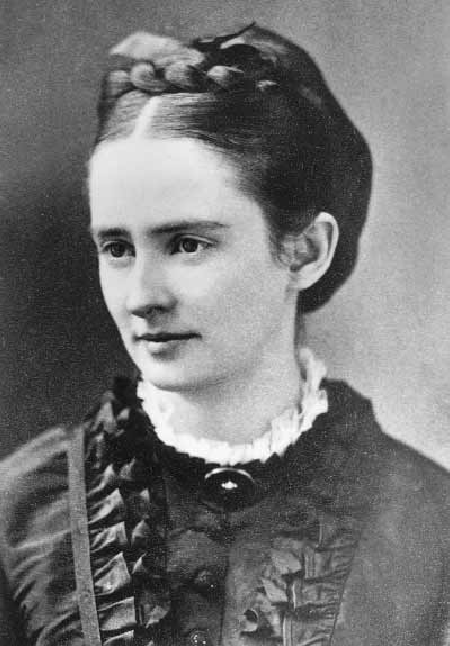
Olivia Langdon Clemens as a young wife, c. 1872. REPRINTED BY PERMISSION OF THE MARK TWAIN HOUSE, HARTFORD, CONNECTICUT.
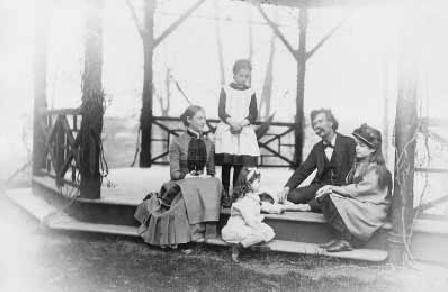
A youdiful family in Hartford, 1884. (left to right) Livy, Clara, Jean, Sam, and Susy Clemens. REPRINTED BY PERMISSION OF THE MARK TWAIN PAPERS, BANCROFT LIBRARY, UNIVERSITY OF CALIFORNIA, BERKELEY (MTP).
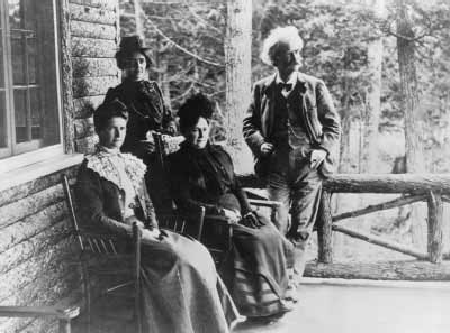
A mature family in the Adirondacks, 1901. (left to right) Jean, Clara, Livy, and Sam Clemens. REPRINTED BY PERMISSION, MTP.
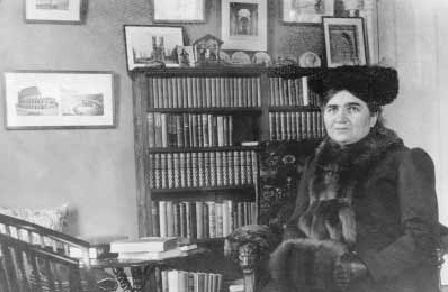
Katy Leary in Jean Clemens's study, January 1905. REPRINTED BY PERMISSION, MTP.
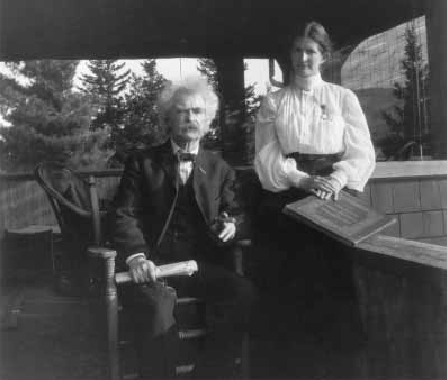
Jean and her father in Dublin, New Hampshire, summer 1905. REPRINTED BY PERMISSION, MTP.
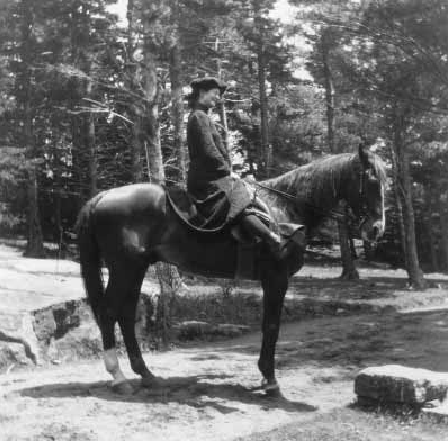
Jean Clemens riding Scott in Dublin, New Hampshire, 1905. REPRINTED BY PERMISSION, MTP.
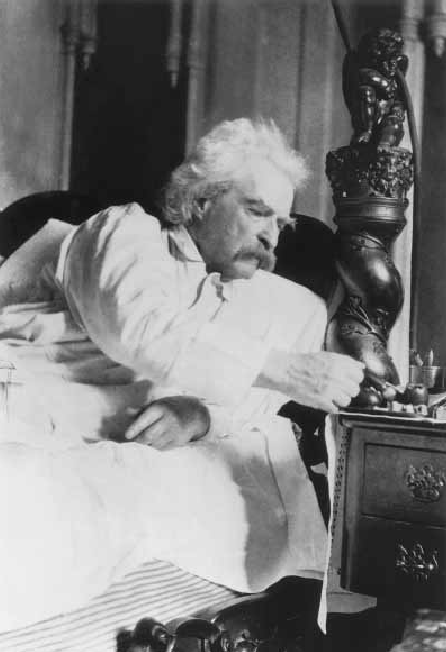
A favorite pastime: Twain smoking in bed, 1906. REPRINTED BY PERMISSION, MTP.
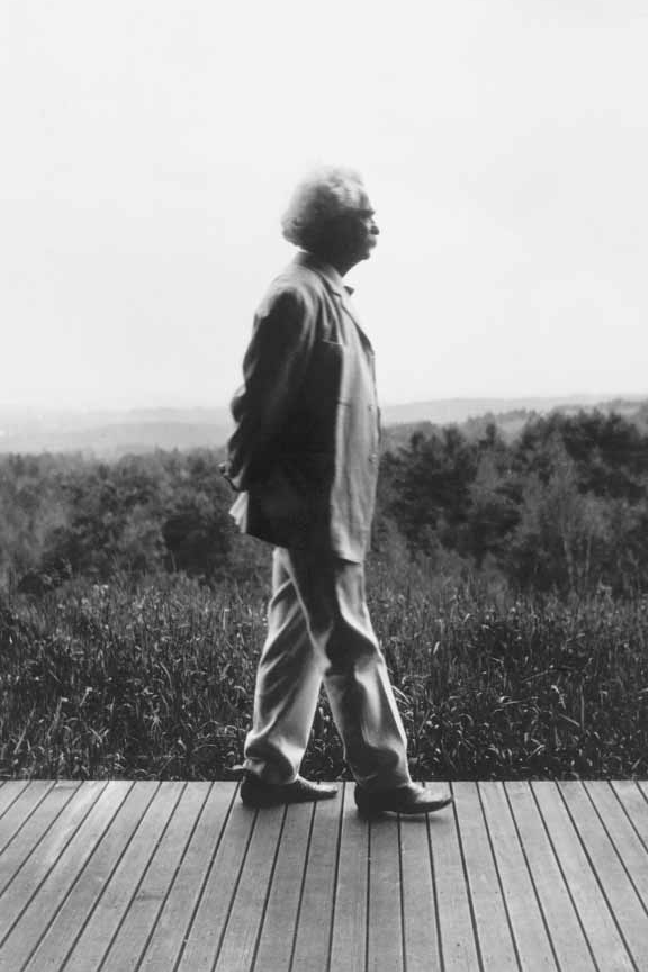
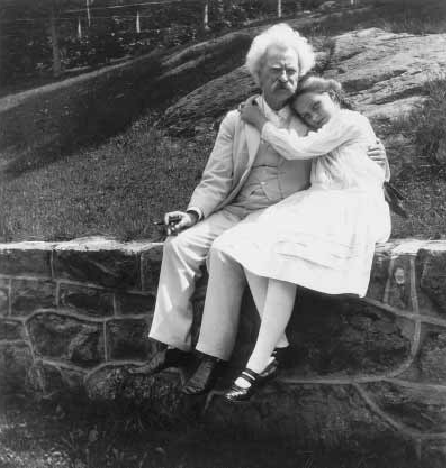
Clemens with Dorothy Quick, one of his favorite Angelfish, in August 1907. REPRINTED BY PERMISSION, MTP.
Twain on the porch of the Upton house, Dublin, New Hampshire, where he dictated several sections of his autobiography, summer 1906.
REPRINTED BY PERMISSION, MTP.
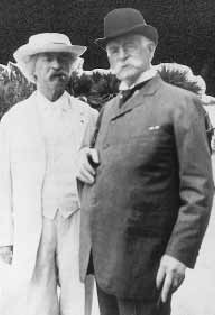
Twain and his best friend, Henry Huttleston Rogers, in Bermuda, 1908. REPRINTED BY PERMISSION, MTP.
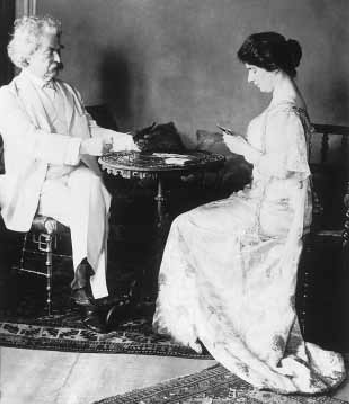
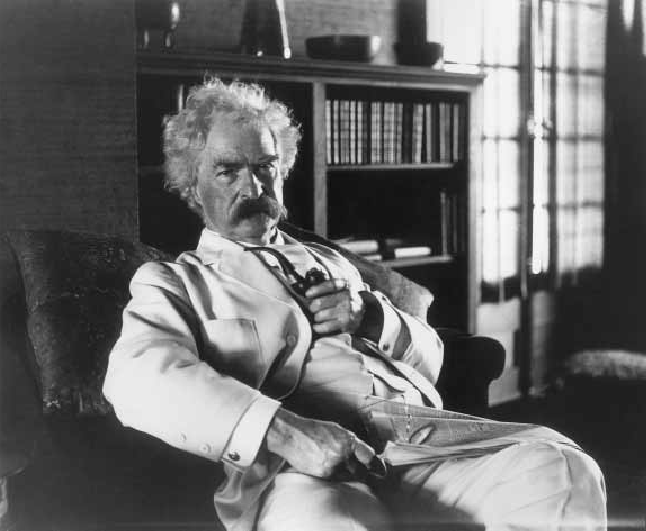
Quintessential Twain, 1908. REPRINTED BY PERMISSION, MTP.
Sam and Clara Clemens playing cards, 1908.
REPRINTED BY PERMISSION, MTP.
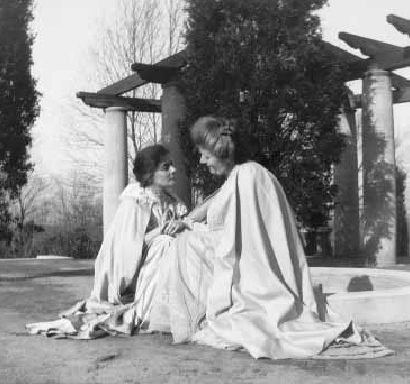
Isabel Lyon (left) posing dramatically with a friend at Storrnfield, 1908. REPRINTED BY PERMISSION, MTP.
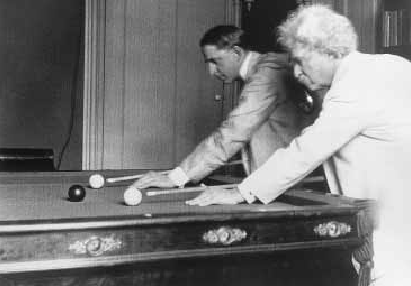
Albert Bigelow Paine and Mark Twain playing billiards, 1908. REPRINTED BY PERMISSION, MTP.
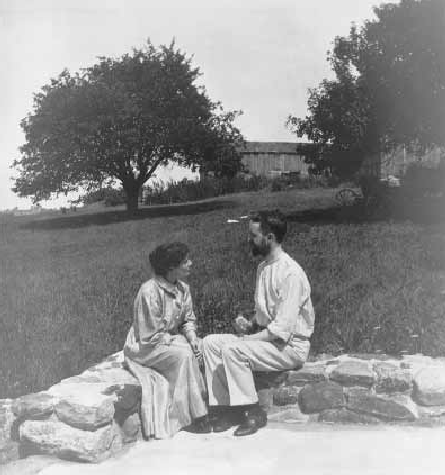
Isabel Lyon and Ralph Ashcroft on the deck of her farmhouse near Stormfield, in Redding, Connecticut, 1908. REPRINTED BY PERMISSION, MTP.

Ashcroft and Twain at Stormfield, 1908–9. REPRINTED BY PERMISSION, MTP.
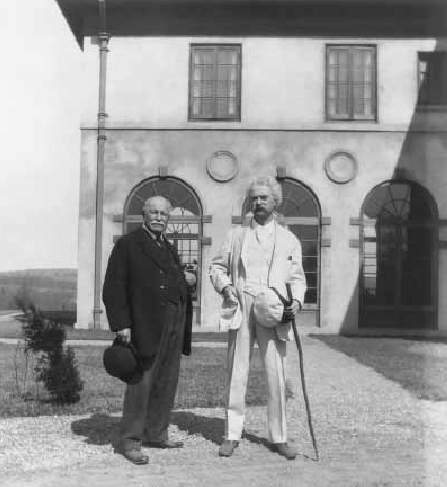
Twain with William Dean Howells, his closest literary friend, at Stormfield, March 1909. This house in Redding, Connecticut, was designed by HowelPs architect son for Twain. REPRINTED BY PERMISSION, MTP.
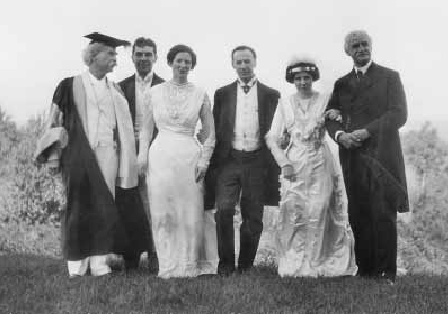
Clara Clemens's wedding, October 1909. (left to right) Sam, Jervis Langdon (a cousin), Jean, Ossip Gabrilowitsch (the bridegroom), Clara, Joseph Twichell (the minister). REPRINTED BY PERMISSION, MTP.
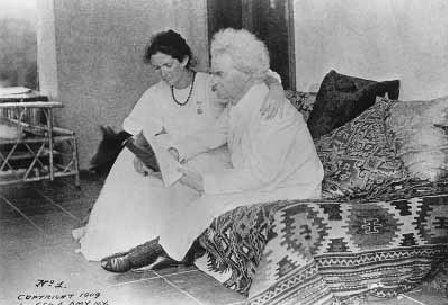
Jean Clemens reunited widi her father, 1909. COURTESY OF THE LIBRARY OF CONGRESS.
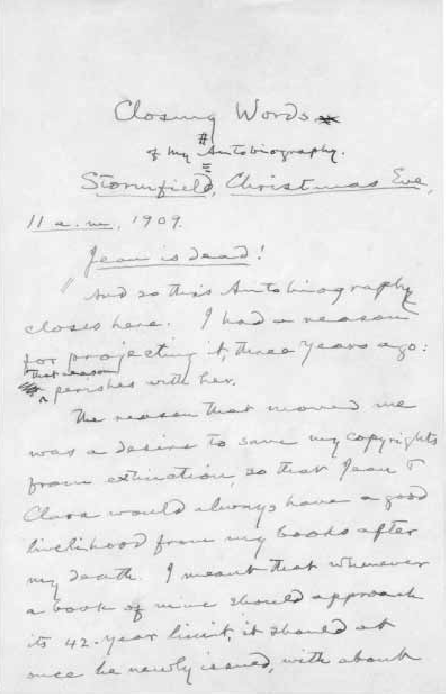
The first manuscript page of Twain's “Closing Words of My Autobiography.” REPRODUCED BY PERMISSION, MTP.
